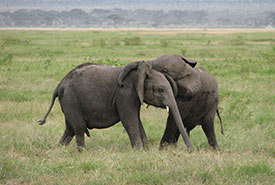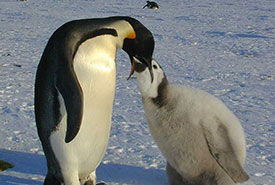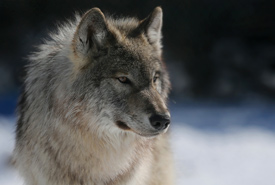Parenting tricks from the wild

Baby elephants playing (Photo by Wikimedia Commons)
Parents everywhere would agree that raising children is no easy feat. New challenges come with every stage of development, from the newborn stage of learning how to eat and sleep, to the more advanced skill of communication. It wasn’t until I had my daughter that I realized just how much work, effort and patience my parents put in to raising…me!
I feel as though the human species have the toughest parenting job; our babies are born helpless and take a long time to reach independence. I wonder how my wildlife counterparts that have more independent offspring handle troubles with their young, and if I can be as graceful as them.
Feeding fussy eaters
Meal times are one of the first opportunities for little ones to exert their independence and make known their refined tastes. Every day, a game of outwit and a test of endurance play out at our dinner table.

Emperor penguin feeding its chick (Photo by Hannes Grobe/AWI, CC BY 3.0)
In the wild, animal parents have unique ways of dealing with fussy-eating babies too. What’s better than a pre-digested, ready-to-eat slurry? From Antarctica’s emperor penguins and the golden jackals of North Africa, to wolves in North America, many animal babies’ first foods are regurgitated goop straight from their parents. Foods stored in the parents’ stomach are preserved and kept safe during their travel between the hunting grounds and home, and served at just the right temperature.
For elephants, two thirds of the food they eat pass through their digestive system intact, and elephant calves actually follow behind the adults to gobble up any dungy goodness that’s been fermented, for easier digestion. Maybe I should try that instead of using a spoon that is sure to be rejected…just kidding!
Sometimes, animals fuss over meal preparations. For my daughter, peeled fruits are preferred, and pasta must be a certain shape. For Kalahari Desert meerkats, millipedes and scorpions are a sought-after menu treat. Meerkat parents teach their young about food safety by showing them how to remove the scorpion’s stinger and scrub away the millipede’s surface toxin in the sand. Any misstep from the young could result in a painful jab to the face or an upset stomach.
Finally, adults can learn something new from young ones. In the 1950s, scientists found a curious 18-month old female Japanese macaque in Koshima, Japan, that washed its sweet potato in the river — the first time that such a behaviour was observed in this macaque tribe. Soon, other macaques began washing their food and, in the years that followed, they were found washing their food in seawater to season them. All thanks to the innovation of one baby!
On handling tantrums and brawls: Have some chill
Wildlife parents generally ignore their kids when they throw fits. Remember the elephant calf that threw a jumbo tantrum and the herd just moved on? Prairie dog moms deal the same way with pups that don’t want to be weaned. In the primate world, Barbary macaques don’t fuss when their babies resist weaning.
Swamp harrier family dynamics play out as survival of the fittest. Parents let their young battle to the death, and sometimes when food is scarce, it means only the strongest fledgling survives, while its weaker siblings become food for the family. At least nothing goes to waste.
Sometimes, it takes a pack

Gray wolf (Photo by Mike Dembeck)
The saying “It takes a village” is just as applicable in wolf families. Raising wolf pups involves the whole pack. Pack members contribute in many ways, including bringing food to the mother who just gave birth and babysitting when pups are older. Pups learn social and survival skills through playing with pack mates and older brothers and sisters; they even have “toys,” such as twigs, animal skins and bones that they “kill.” As for me, I certainly appreciate all the help from my family and friends, and it’s remarkable to see familiar social dynamics in the animal kingdom.
In my research, I found similarities and differences that human parents can appreciate. Wildlife parents don’t necessarily have it easier — many put their lives on the line to bring home food. Upon reflection, perhaps my temporary struggles in this stage of parenthood aren’t so terrible after all. It is comforting to know that parents of other species strive to protect and raise healthy, capable members of their kind, each in their own unique ways.
To learn how you can help conserve the habitats that wildlife families need to thrive, visit our website.


